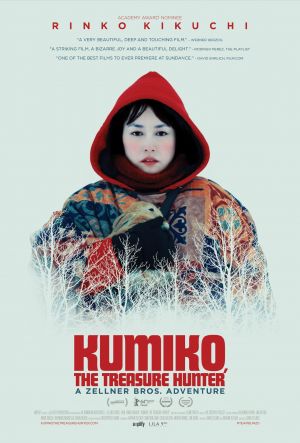By Duncan Sinclair

“Hell of a lot of truth in [that picture]. Hell of a lot of truth.” -World Cinema Dir. Joel and Ethan Coen
The Coen brothers’ 1996 classic Fargo purports to be a true story. In actuality, the film is inspired by true events but spins its own yarn, reveling in all the quirks and plot conveniences that good fiction allows. Kumiko the Treasure Hunter uses the same conceit; this is not a true story, but that doesn’t stop the film’s brother-duo writers from having fun with their premise. In the early Aughts a young woman from Japan was found frozen in a Minnesota field. An urban legend quickly arose about how she was traveling to Fargo after being convinced that the movie was real. Basing their film off of this debunked myth, the Zellner brothers one-up the Coens by claiming legitimacy with a story that has no basis in reality. But by making their heroine relatable and honest they continue in the Coens’ motives for deceit: that there can be truth found in the fiction we see on screen. What matters is in knowing how to look for it.
Kumiko as played by Oscar nominee Rinko Kikuchi is an anti-social, possibly autistic Office Lady who rejects the traditional life that her boss and mother expect of her. To her, finding the “treasure” is less about the money than it is a way for her to succeed on her own terms. Kumiko is very uncomfortable everywhere she goes; she freezes up when confronted by an old acquaintance and timidly avoids eye contact during every conversation. Zellner overwhelms Kikuchi in the frame by placing her in claustrophobic spaces when in Tokyo, and creating an eerie sound design to get the audience feeling as alienated and awkward as she feels. This alienation is pronounced as her means of travel become limited and the language/cultural barrier prevents her from easily making the trip from Minneapolis to Fargo.
Whatever social or possible mental issues hinder Kumiko she is steadfast in her goals, no matter how lofty or nonsensical they are. And when those goals are contrasted with those of her traditionalist Japanese elders or the well meaning but culturally ignorant Minnesotans they become more and more admirable. Her victory may be hollow but it represents something greater: that we choose what fictions we believe in order to escape the ones imposed on us. When the Coens opened their film with “This is a True Story”, it was done to bring their eccentric but soulful tale down to Earth. When Kumiko opens with the same quote (and I mean exact, it flashes the Fargo title card as a VHS of the film plays) it does so in the spirit of everyone who found meaning in those words. Kumiko may have been duped by a movie’s false promise of literal riches, but as her own movie proves we can all find truth in a comical tale set in the frosty Midwest.